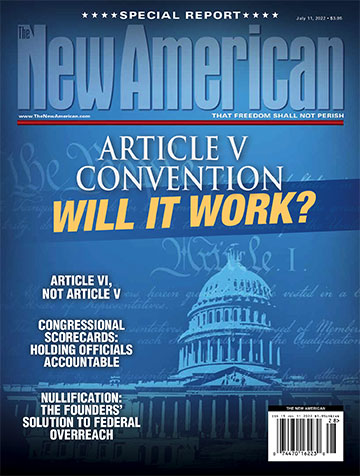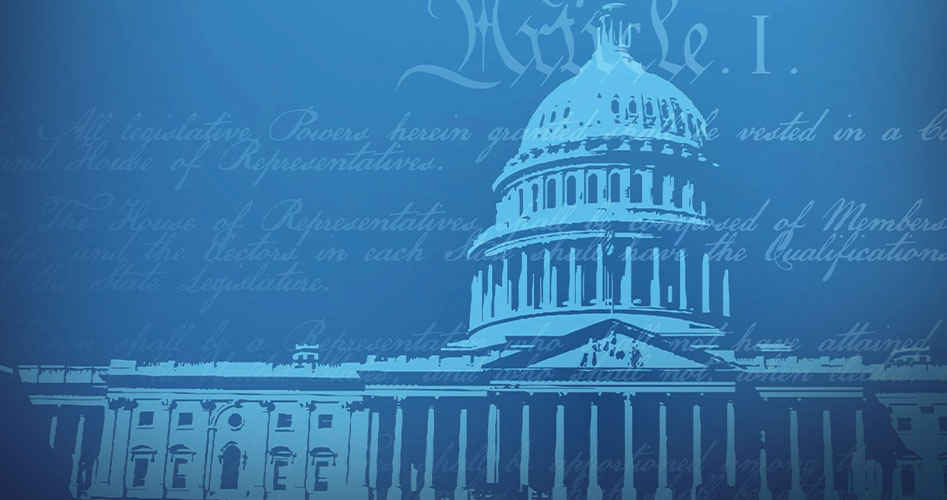Article V Convention: Will It Work?
A growing number of Americans distrust the federal government. According to a Pew Research Center poll, published on June 6, 2022, “Only two-in-ten Americans say they trust the government in Washington to do what is right ‘just about always’ (2%) or ‘most of the time’ (19%).” Similarly, according to a Monmouth University poll, released on May 12, 2022, 79 percent of Americans surveyed said that they believe the country has “gotten off on the wrong track.”
Most Americans recognize that an all-out war is being waged against the Republic and every American’s individual liberty. Whether it’s mass shootings, gun control, abortion, election fraud, or the teaching of critical race theory and LGBTQ “gender identity” in public schools, virtually every conceivable assault has been used to frustrate and rile up Americans. Behind all of this smoke, a fire is raging.
Some have suggested that the best way to put out this fire is with an Article V Convention. Pro-convention advocates and organizations, such as Convention of States (COS) Action, argue that the Founding Fathers gave us Article V “for such a time as this,” taking the phrase from the biblical book of Esther. Are they right? Is now such a time? Or will a convention that will open up the Constitution for amending or rewriting merely play into the hands of the very arsonists stoking the flames?
Before these questions can be answered, it’s important that we properly understand Article V.
What Is Article V?
The fifth article of the U.S. Constitution, Article V, is the amendment article. It provides two methods for proposing amendments to the Constitution and two modes of ratification. Either Congress proposes amendments (when two-thirds of both houses see fit), or a convention (called by Congress) proposes amendments if two-thirds of the state legislatures apply for it.
In either case, the proposed amendments officially become part of the Constitution when “ratified by the Legislatures of three fourths of the several States, or by Conventions in three fourths thereof, as the one or the other Mode of Ratification may be proposed by the Congress.” If a new constitution comes out of the convention, however, it could have its own mode of ratification.
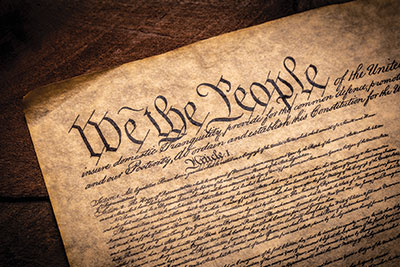
“We the People”: The Constitution, and the federal government it established, derived its authority from the American people. A Constitutional Convention is the ultimate embodiment of the sovereign will of “We the People” through their selected delegates to frame, revise, or amend the Constitution. (Photo credit: jaflippo/ iStock / Getty Images Plus)
All 27 amendments to the Constitution, including the first 10 (the Bill of Rights), were initially proposed and passed by Congress and afterward sent to the states for ratification. Never in the 230-plus years of American history since our Constitution was ratified has a convention been used to propose amendments.
The Framers of the Constitution created Article V in order to provide for a peaceful and orderly method to correct any defects or errors, such as a lack of safeguards of the people’s unalienable rights. By defects they did not mean a lack of adherence to the Constitution, or violations of the Constitution, by elected officials. Instead, they meant a failure to protect or safeguard the God-given rights and individual liberty of the people. By amending the Constitution, such errors could be remedied without resorting to chance or violence. The Bill of Rights, for example, was a correction of a defect.
On June 11, 1787, at the Federal Convention, Colonel George Mason said of the new Constitution, “The plan now to be formed will certainly be defective, as the Confederation has been found on trial to be. Amendments therefore will be necessary, and it will be better to provide for them, in an easy, regular and Constitutional way than to trust to chance and violence.”
Mason was concerned that the proposing of amendments would mainly be dependent on Congress. Hence, the convention method was included to allow delegates of the people to propose amendments.
COS Action repeatedly claims, as one of its key arguments, that Mason said Article V should include a convention method so that, whenever Congress or the federal government becomes tyrannical and violates its constitutional limitations, the states could in turn propose amendments to the Constitution in order to rein them in. Attorney Michael Farris, on behalf of COS, wrote:
George Mason demanded that this provision [the convention for proposing amendments] be included in Article V because he correctly forecast the situation we face today. He predicted that Washington, D.C. would violate its constitutional limitations and the States would need to make adjustments to the constitutional text in order to rein in the abuse of power by the federal government.
In reality, neither Mason nor any other Framer of the Constitution said anything of the sort. What Mason did say, as mentioned earlier, was that the Congress may become oppressive and not agree to amendments. According to Madison’s Notes on the Debates in the Federal Convention of 1787,
Col. MASON thought the plan of amending the Constitution exceptionable & dangerous. As the proposing of amendments is in both the modes to depend, in the first immediately, in the second, ultimately, on Congress, no amendments of the proper kind would ever be obtained by the people, if the Government should become oppressive, as he verily believed would be the case. [Emphasis added.]
COS Action has taken Mason’s words out of their original context in order to fit its narrative. Madison warned of the strategy to use amendments as a pretext to get a new constitution.
The Constitution already sets limits on the federal government via enumerated powers. The notion that amendments can be used to limit or restrict powers that were never given to the federal government by the Constitution in the first place, or that an Article V Convention can be used to regulate the behavior of those who already violate the Constitution, is illogical.
What Is an Article V Convention?
An Article V Convention is a federal convention designed to propose amendments to the federal Constitution. By definition, an Article V Convention is a federal Constitutional Convention.
Black’s Law Dictionary — the nation’s premier legal dictionary used by law students, lawyers, and judges — has, since its second edition printing in 1910, consistently defined the term “constitutional convention” as “A duly constituted assembly of delegates or representatives of the people of a state or nation for the purpose of framing, revising, or amending its constitution.” (Emphasis added.) The fifth edition of Black’s Law Dictionary, published in 1979, further states, “Art. V of the U.S. Const. provides that a Constitutional Convention may be called on the application of the Legislatures of two-thirds of the states.” An Article V Convention is in fact a Constitutional Convention.
What Is a Constitutional Convention?
A convention is a formal gathering of deputies or delegates — chosen and recognized by the people they represent — for a common purpose. The convention in Article V exercises a sovereign function as defined earlier by Black’s Law Dictionary. It is a convention with the purpose of proposing modifications (plural) to government, if you will. Seeing as the convention by definition represents the people at large, it has power and scope that supersedes established governments. As such, the convention cannot be limited, because it is the epitome of the sovereign will of the people. The Declaration of Independence clearly reads, “it is their right, it is their duty, to throw off such Government, and to provide new Guards for their future security,” referring to the people. James Madison invoked this right in The Federalist, No. 40, to justify the actions of the delegates in the 1787 convention, writing that it is “the transcendent and precious right of the people to ‘abolish or alter their governments as to them shall seem most likely to effect their safety and happiness.’”
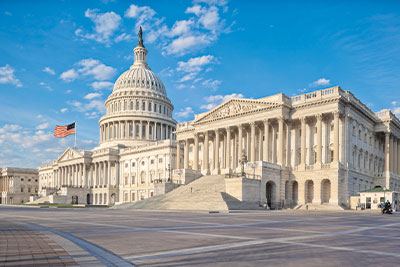
Making the call: According to Article V of the U.S. Constitution, either Congress proposes amendments to the Constitution (when two-thirds of both legislative chambers see fit), or a convention proposes amendments if two-thirds of the state legislatures apply for it. In the second method, Congress calls the convention and plays a vital role until the convention convenes. (Photo credit: drnadig/E+/GettyImagesPlus)
It was the general view at the time that conventions representative of the people were the only legitimate bodies able to draft, alter, or amend constitutions. Thomas Jefferson in his Notes on the State of Virginia observed, “The other states in the Union have been of the opinion, that to render a form of government unalterable by ordinary acts of assembly, the people must delegate persons with special powers. They have accordingly chosen special conventions to form and fix their governments.”
Congregationalist minister Samuel West, regarded as one of the most influential citizens in Massachusetts at the time, said, in his election sermon of 1776, “It is the major part of a community that have the sole right of establishing a constitution and authorizing magistrates; and consequently it is only the major part of the community that can claim the right of altering the constitution, and displacing the magistrates.” In other words, for a constitution to be created and possess legal binding authority, it must originate from the majority of the people themselves.
In order to achieve this, West explained, “hence comes the necessity of appointing delegates to represent the people in general assembly.” Of this, historian Gordon S. Wood writes in The Creation of the American Republic 1776-1787, “Thus it followed that it was assemblies representing the community that had the right to establish or alter a constitution. And most in 1776 agreed.”
A legislative assembly, such as a legislature, congress, or parliament, has the sole authority to make laws. However, the convention — comprised of delegates representing the people — possesses the exclusive authority to write or amend a constitution. No matter what name is used to describe the convention in Article V, it still possesses unlimited power. At a convention, delegates can go through every single article in the Constitution and rewrite each one, remove some or all, replace some or all, or add some, which would ultimately result in an entirely new Constitution. Constitutions establish and bind their respective governments. And in our current political, cultural, and economic climate, “who knows what would come out of it,” as the late Justice Antonin Scalia stated in an episode of The Kalb Report in 2014, referring to an Article V Convention.
Who Calls the Convention?
Under Article V Congress calls the convention when two-thirds of the states apply. States do not call the convention. The only power that is guaranteed to the state legislatures in the convention method is that of applying, or making the “Application,” to Congress for the convention. The authority of Congress cannot and should not be ignored. Congress’ power to call a convention includes setting its location, time, and date, and creating the process for the selection of delegates to the convention.
Article I, Section 8, Clause 18 of the U.S. Constitution, also known as the Necessary and Proper Clause, clearly states: “The Congress shall have Power … To make all Laws which shall be necessary and proper for carrying into Execution the foregoing Powers, and all other Powers vested by this Constitution in the Government of the United States, or in any Department or Officer thereof.” (Emphasis added.) Calling a convention is a power vested in Congress by Article V of the Constitution. In fact, the very first two words of Article V are “The Congress.”
The Supreme Court affirmed this in Dillon v. Gloss (1921), when it opined, “As a rule, the Constitution speaks in general terms, leaving Congress to deal with subsidiary matters of detail as the public interests and changing conditions may require, and Article V is no exception to the rule.” (Emphasis added.)
But again, COS makes the false claim that “The Necessary and Proper Clause does not apply to Article V at all, because when Congress acts pursuant to Article V, it is not acting in its regular, legislative capacity,” further adding, “The federal courts have ruled that Congress’ attempt to use Article I power to affect the Article V process through ordinary legislation was unconstitutional.” COS then points to State of Idaho v. Freeman.
However, this case has absolutely nothing to do with the Necessary and Proper Clause. The question in State of Idaho v. Freeman was not whether Congress has power to enact legislation pursuant to Article V, but rather how much power. State of Idaho v. Freeman called into question “the validity of Idaho’s act of rescinding its prior ratification of the proposed ‘Equal Rights Amendment’ to the Constitution of the United States, and the constitutionality of Congress’ act in extending the time period in which ratifications may be received.” In other words, the two questions were: 1) Is a state allowed to rescind its previous ratification of a proposed constitutional amendment and, 2) does Congress have the authority to extend the time period for the ratification of a proposed amendment?
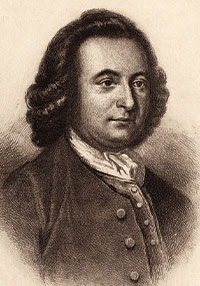
The colonel’s concern: Colonel George Mason worried that the Congress would be oppressive and that “no amendments of the proper kind would ever be obtained by the people.” He felt Congress might stand in the way of the proposing of amendments, thus the need for the convention method.
In its decision, the Court declared that “a state has the power and right to rescind a prior ratification of a proposed constitutional amendment at any time prior to the unrescinded ratification by three-fourths of the states of the United States” and that “Congress’ attempted extension of the time for the ratification of the … [proposed Equal Rights Amendment] was null and void.” This has absolutely no bearing on or relation to Congress’ vested constitutional power of calling a convention.
Once the convention convenes, only the deputies or delegates to the convention (not the state legislatures or Congress) have the authority to draft the rules for governing the convention, to elect the president of the convention, and, most importantly, to write the actual text of the proposed amendments or potentially draft and propose a new constitution. When assembled at the convention, the delegates are not subordinate to the state legislatures or Congress. They are the sovereign representatives of the people at large, with the convention being a sovereign body.
Is It a “Convention of States”?
An Article V Convention is a federal function, called by the federal government to amend the federal Constitution. As such it is not a function, nor under the purview, of the state governments. As stated before, an Article V Convention is a federal Constitutional Convention. An Article V Convention is not a “Convention of States.” There is no such thing as an “Article V Convention of States.”
Not only is the phrase “Convention of States” nowhere to be found in the text of Article V, but prior to 2013, hardly anyone referred to an Article V Convention as a “Convention of States.” Labeling an Article V Convention as a “Convention of States” can be traced to September 16, 2010, when convention-promoter Robert Natelson announced in a speech:
I’m going to put our concepts on “reset.”… The Constitution gives the convention a specific name — a convention for proposing amendments — and I think we should call it that or perhaps an Article V convention, an amendments convention, or a convention of the states. (Emphasis added).
Natelson changed the name. In 2013, attorney Mark Meckler founded the organization Citizens for Self-Governance, which that same year launched its Convention of States Project, now officially Convention of States Action, or simply COS Action.
In a memo sent to the members of the Ohio Senate General Government Budget Committee on May 23, 2022, Meckler and national legislative strategist for COS Action Rita Peters explain why they use the name and refer to an Article V Convention as a “Convention of States.” In the memo, they claim, “‘Convention of states’ is the label first applied to an Article V convention for proposing amendments by the General Assembly of the Commonwealth of Virginia when it passed the first application for an Article V Convention to propose the Bill of Rights in 1788.”
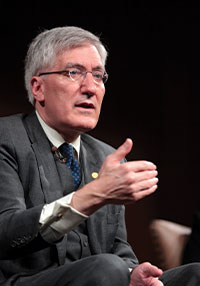
Conservative? Robert P. George, a member of COS Action’s legal advisory board, co-authored the so-called Conservative Constitution for the National Constitution Center’s Constitution Drafting Project to replace the current Constitution. George’s Conservative Constitution guts the Second Amendment and authorizes gun control. (Photo credit: GageSkidmore)
While Virginia’s application from 1788 for an Article V Convention did use the phrase “convention of the States,” the resolution went on to call it a “convention […] of deputies from the several States.” Likewise, New York’s application from 1789 for an Article V Convention (the second application passed under Article V) also referred to it as a “Convention of Deputies from the several States.” The specific phrase “Convention of States” or “convention of the states” appears in no other application for an Article V Convention prior to 2010.
However, the term “Convention of the States” was actually first applied to the Federal Convention of 1787 — the very same convention that COS insists was not a “Convention of States” because it was the convention that drafted the current Constitution. While the Convention of 1787 was referred to as a “Convention of the States” numerous times, a federal Constitutional Convention under Article V is not. Regardless of what name is used to identify an Article V Convention, it is by definition a convention with power over and above proposing amendments, which is why it cannot be “limited,” or limited to a single subject.
Meckler and COS are claiming that the terms “Convention of States” and “Constitutional Convention” have completely different meanings. On their website, COS states, “It is not a convention of delegates but a convention of states.… This is also a matter of history. In 1788, the Virginia legislature correctly called this process a ‘convention of states’ in the first application ever passed under Article V.” In a video titled “Why the American Framers inserted Convention of States into the Constitution,” posted on the YouTube channel for Convention of States Project on October 16, 2020, Mark Meckler said that “the second part of Article V gives the states, two-thirds of them, the power to call and convene a Convention of States for proposing amendments.”
They also define a “Convention of States” to mean an Article V Convention limited to amending the Constitution. They claim that a “Convention of States” is only for amending the Constitution, whereas the term “Constitutional Convention” they define to mean a convention exclusively for framing or writing a new constitution.
Meckler and the COS organization often repeat this and have led many to believe that the states, specifically the state legislatures, have the power to call the convention. Because the states call the convention, Meckler and COS claim, they will in turn control the convention, while Congress simply sits powerless on the sidelines.
These claims are utterly false. Congress calls the convention and plays a role until the convention convenes. Yet, COS’s false distinctions between a Constitutional Convention and a “Convention of States” has gone a long way toward convincing state legislators that a “Convention of States” could never exceed its “limited” authority and draft an entirely new constitution.
An Article V Convention can propose an entirely new constitution, as evident by the new constitutions that have already been drafted and are ready to be submitted to a convention if called. Such drafted constitutions include the “Constitution for the Newstates of America,” published in the book The Emerging Constitution (1974) by Rexford G. Tugwell — an avowed socialist; Constitution for the New Socialist Republic in North America, a booklet published by the Revolutionary Communist Party, USA; “A New Constitution for The United States,” also known as the “Democracy Constitution,” published in Democracy: A Journal of Ideas; “The Libertarian Constitution,” published on the website of the National Constitution Center (NCC); and “The Progressive Constitution,” also published on the NCC’s website.
In fact, one of the latest constitutions already written and prepared to be submitted comes from Robert P. George. On November 8, 2021, while participating in a roundtable discussion organized by Pennsylvania lawmakers, Mark Meckler identified Robert P. George as being on COS’s legal advisory board. By then, George had already co-authored “The Conservative Constitution” for the NCC’s Constitution Drafting Project to replace the current Constitution, and it is anything but “conservative.” For example, it would gut the Second Amendment. Section 12 of the “Conservative Constitution” reads in part:
Neither the States nor the United States shall make or enforce any law infringing the right to keep and bear arms of the sort ordinarily used for self-defense and recreational purposes, provided that States and the United States in places subject to its general regulatory authority, may enact and enforce reasonable regulations on the bearing of arms, and the keeping of arms by persons determined, with due process, to be dangerous to themselves or others. [Emphasis added.]

Face of the movement: Mark Meckler, a technology law and internet privacy attorney from California, founded Citizens for Self-Governance, which in 2013 launched its Convention of States Project. Meckler and COS falsely claim that an Article V Convention is a “Convention of States” and not a federal Constitutional Convention. (Photo credit: GageSkidmore)
Based on this language, who gets to decide what constitutes “ordinarily used for self-defense and recreational purposes”? How would leftist lawmakers and future courts interpret what is meant by “reasonable regulations”? Who would someone such as U.S. Attorney General Merrick Garland say fits the description of “persons determined, with due process, to be dangerous to … others”? Even a so-called conservative constitution, such as the one co-authored by George, would be like giving matches to an arsonist.
To say that a convention under Article V is a “Convention of the States” and not a Constitutional Convention, because a Convention of States is only for amending rather than rewriting the Constitution, is completely disingenuous and ignores the historical record. Simply put, an Article V Convention is not a “Convention of States,” and to claim that the states control the convention process is utterly false.
What About Ratification?
According to Article V, any amendments, whether proposed by Congress or a Constitutional Convention, officially become part of the Constitution “when ratified by the Legislatures of three fourths of the several States, or by Conventions in three fourths thereof, as the one or the other Mode of Ratification may be proposed by the Congress.” When it comes to a Constitutional Convention, the mode of ratification is only relevant if amendments come out of the convention. If the convention delegates draft and propose an entirely new constitution — containing its own mode of ratification — then the new constitution would be ratified in accordance with its new mode of ratification, as was the case with our current Constitution.
However, even if the delegates to the convention restrain themselves to only producing new amendments, the three-fourths requirement for ratification is by no means any safeguard or guarantee against terrible amendments from becoming part of the Constitution. In fact, three-fourths of the state legislatures thought it was a good idea when they ratified the federal income tax (16th Amendment) and the direct election of U.S. senators (17th Amendment). If you love filing and paying income taxes to the federal government, you can thank three-fourths of the states!
When the delegates met in Philadelphia in 1787 with “the sole and express purpose of revising the Articles of Confederation,” they were repeatedly reminded that any alterations they made had to be “confirmed by the legislatures of every State,” in accordance with Article XIII of the Articles of Confederation. Instead — and to our benefit — they wrote an entirely new and far-superior Constitution. But rather than being ratified by the Confederation Congress and “afterwards confirmed by the legislatures of every state,” as Article XIII required, the new Constitution was ratified using its own mode of ratification. Article VII of the current Constitution reads, “The Ratification of the Conventions of nine States, shall be sufficient for the Establishment of this Constitution between the States so ratifying the Same.” (Emphasis added.)
Mark Meckler and COS repeatedly claim that all states did ratify the new Constitution. Here’s what actually happened: The Constitution was officially ratified on June 21, 1788, when New Hampshire became the ninth state to ratify it — the bare minimum required for ratification under Article VII of the current Constitution. On September 13, 1788, with only 11 of the 13 states having ratified the Constitution, the Confederation Congress passed a resolution stating that it “has been ratified in the manner therein declared to be sufficient for the establishment of the same [i.e., Article VII], and such ratifications, duly authenticated, have been received by Congress, and filed in the office of the secretary.” Neither North Carolina nor Rhode Island had yet ratified the new Constitution.
In fact, the Articles of Confederation became obsolete before the current Constitution was ratified by all 13 states. The First United States Congress, under the Constitution, began on March 4, 1789, and George Washington was sworn in as the President of the United States under the U.S. Constitution on April 30, 1789. North Carolina ratified the Constitution several months later, on November 21, 1789. And Rhode Island became the 13th state to ratify the Constitution on May 29, 1790 — nearly two years after its official ratification. Clearly, the new Constitution was adopted before being “confirmed by the legislatures of every State,” as required by Article XIII of the Articles of Confederation.
If Not Article V, Then What?
The answer is enforcement and nullification. Nullification is firmly grounded in the text of the U.S. Constitution. Specifically, Article VI binds state legislators — along with members of Congress, judges, and all other officers at large — to their oath “to support this Constitution.”
Article VI also states, “This Constitution, and the Laws of the United States which shall be made in Pursuance thereof … shall be the supreme Law of the Land.” (Emphasis added.) State legislators are required to uphold and implement only those laws that are “made in Pursuance” of the Constitution. Any laws not “made in Pursuance thereof” are therefore not the “supreme Law of the Land,” and as such, state legislators are under no obligation to enforce or carry out their provisions.
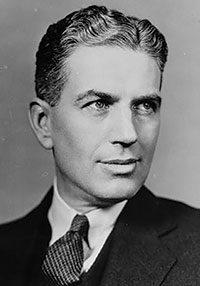
Progressive rewrite: Rexford Tugwell, an avowed socialist, was hired by the Ford Foundation to write a new constitution for America’s then-upcoming bicentennial in 1976. Tugwell’s “Constitution for the Newstates of America” appeared in his book The Emerging Constitution. (Photo credit: Library of Congress)
Instead, they should nullify such laws within the boundaries of their state. Whereas it may take years or decades for three-fourths of states to apply to Congress before Congress calls a convention, nullification by those states’ respective legislatures would stop unconstitutional laws immediately. If, say, South Dakota and Ohio want to stop the enforcement of a blatantly unconstitutional federal action, they would not have to wait on 32 other states to act. (For more on how nullification can and is being used to rein in the federal government, see "Nullification: The Founders' Solution to Federal Overreach," by Peter Rykowski.)
Those seeking real ways to extinguish the fire should avoid the time, energy, and financial resources that would be wasted in getting states to apply to Congress to call a convention that would no doubt destroy the Constitution. Instead, the same time, energy, and resources should be invested in educating the electorate and holding elected officials accountable to the Constitution and their oath. An excellent tool to hold one’s U.S. representative and senators accountable and to educate others on how they are voting on key issues is The New American’s “Congressional Scorecards.” (For more about the scorecards, see "Congressional Scorecards," by Peter Rykowski.)
No one should be conned by COS, Mark Meckler, and others into supporting a convention that has the power to rewrite the Constitution. One need not fix what is not broken. If the current batch of representatives and senators in Congress are the problem, then change those members of Congress — not the Constitution!
In chapter four, verse 16 of the book of Hosea, the prophet laments, “My people are destroyed for lack of knowledge.” Likewise, the prophet Isaiah observes in Isaiah 5:13, “Therefore my people are gone into captivity, because they have no knowledge.” While much can be gleaned from these passages, they share a principle that could be applied to any people and nation — the consequences of forsaking or neglecting knowledge, in our case, knowledge of the Constitution. In 1831, Alexis de Tocqueville observed the following during his travel in America: “In New England, every citizen receives the elementary notions of human knowledge; he is moreover taught the doctrines and the evidences of his religion, the history of his country, and the leading features of its Constitution. In the States of Connecticut and Massachusetts, it is extremely rare to find a man imperfectly acquainted with all these things, and a person wholly ignorant of them is a sort of phenomenon.” (Emphasis added.)
Ask yourself this: What is your congressman’s understanding of the Constitution? How about your neighbors’ and that of other voters in your congressional district? The present destruction and loss of individual liberty in America stems not from a Constitution riddled with errors and defects. Rather, it stems from a lack of knowledge of the Constitution. An ignorant electorate could never hold their elected officials accountable to the Constitution and their oath of office. The less familiar the electorate are with the Constitution, the less likely they are to elect constitutionalists into office in the first place. And no amendment to the Constitution is a substitute for a well-educated electorate, as even a good constitutional amendment would still require an educated electorate to see that it is properly understood and upheld. An excellent antidote to remedy Americans’ constitutional illiteracy is The John Birch Society’s educational Constitution Is the Solution video lecture series. The videos can be obtained as a DVD box set on ShopJBS.org, or can be viewed for free on JBS.org/Constitution/Video/.
As part of stopping the present movement for an Article V Convention, Americans in states that have previously passed and sent to Congress applications to call a convention must put pressure on their state legislators to rescind those applications.

No safeguard: Three-fourths of the states — which convention promoters insist would block the ratification of any bad or partisan amendments — thought it was a good idea when they ratified the progressive income tax (16th Amendment) and the direct election of U.S. senators (17th Amendment). (Photo credit: Piotrekswat/iStock/GettyImagesPlus)
To reiterate, the above can be summarized in the following nine key points:
• Article V is for the correction of errors or defects in the Constitution (for example, the inclusion of the Bill of Rights was a correction of a defect);
• an Article V Convention is a federal Constitutional Convention;
• a convention is the ultimate embodiment of the sovereign will of the people at large through their selected delegates who possess the power to rewrite the Constitution;
• the convention method was added so that Congress was not the only body to propose amendments — it was never meant to rein in the power and jurisdiction of the federal government;
• Congress calls the convention;
• an Article V Convention is not a “Convention of States”;
• ratification by three-fourths of the states is no safeguard against bad amendments;
• nullification, under Article VI, is the only constitutional remedy for the states to stop federal tyranny within their borders; and
• an educated electorate is essential to safeguarding liberty.
Putting Out the Fire
A federal Constitutional Convention, under Article V, is not a “Convention of States,” and as such will not extinguish the aforementioned fire. Those stoking the flames of the fire currently raging through America would love nothing more than to have the opportunity to rewrite the Constitution. An Article V Convention, even one called with good intentions, could be the final spark that reduces the Constitution and the American Republic into a heap of ashes. Rather than helping the arsonists burn down individual liberty and the Constitution, patriots and supporters of the Constitution should join the educational and action-oriented efforts of pro-constitutionalist organizations such as The John Birch Society to help keep the Republic and preserve the Constitution. The U.S. Constitution remains the greatest roadblock to tyranny and collectivism. All Americans must preserve freedom by enforcing the Constitution rather than promoting a convention to amend or rewrite it.
Christian Gomez is research project manager for The John Birch Society.


